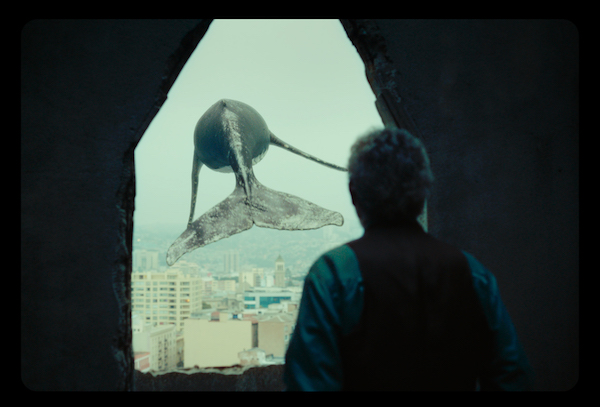 An image from Alireza Khatami's "Oblivion Verses" film. (Photo by House on Fire)
An image from Alireza Khatami's "Oblivion Verses" film. (Photo by House on Fire)CHICAGO — Alireza Khatami finds the roles of educator and student are sometimes blurred in his classroom, which he fully embraces.
“I believe teaching is a collaboration between a teacher and a student,” said Khatami, an assistant professor in DePaul University’s School of Cinematic Arts. “I respect what they already know and they respect my experience. We meet halfway and exchange ideas.”
The exchange allows Khatami to build trust and credibility in his directing and cinema production classes. It also helps that he recently completed his first feature-length film, “Oblivion Verses.” The award-winning film has been accepted into several international film festivals, including Chicago.
“I try to let students learn from mistakes I have made,” Khatami said. “Filmmaking is about taking risks and some work out and some don’t. I’m constantly trying to connect real-life experience with why we are doing each assignment.”
Khatami, who previously only made short films, spent last year simultaneously teaching at DePaul and doing post-production for “Oblivion Verses.” In the process, he updated his syllabus to include filmmaking techniques on both short and long productions.
“Now in my teaching, I emphasize that you need to constantly think of the bigger picture and not just one frame,” he said. “You need to have endurance to direct a feature film as it’s a much longer process. I’m now trying to prepare students for a marathon, not just a 100-meter race.”
 Alireza Khatami, filmmaker and assistant professor of directing and cinema production.
Alireza Khatami, filmmaker and assistant professor of directing and cinema production.Khatami’s field experience, he filmed “Oblivion Verses” in Chile with financial backing from French, Dutch, German and Chilean production companies, provides another layer of knowledge he shares with students.
“Ali is truly an international filmmaker in every sense of the word,” said Gary Novak, director of the School of Cinematic Arts. “Cinema has always been an international art form, which is something some of our students may lose sight of. The knowledge and experience he brings to the classroom is a perspective that our students benefit from greatly.”
Childhood memories on the big screenKhatami can pinpoint the only scene in the movie he did not direct. It occurs early in the Spanish-language film, also known as “Los Versos del Olvi
do,” about an elderly caretaker of a remote morgue in an unknown location. The police have left the main character’s facility and he walks to the morgue’s entrance and peeks inside.
“I had to ask my assistant to do the filming so I could Skype my job interview with DePaul,” Khatami said.
That scene sets off the plot of the movie and the caretaker’s attempt to give an unnamed woman a proper burial after her body is left behind. A subplot involves a family of whales, which Khatami said gives the film a “magic realist” feel and a “lighthearted and humorous take on a very tragic story.”
The Hollywood Reporter’s review of the film said Khatami “has a real talent for creating images of abandon peppered with surrealist touches.”
Khatami said his childhood in Iran inspired him to write the screenplay about people who disappeared “without a trace.”
“I grew up during the Iran-Iraq war and there were soldiers who died and were never found,” he said. That led to a preoccupation with the “missing,” whether victims of war in Iran, the indigenous women in Canada or refugees at the U.S. border, Khatami explained.
The film had its world premiere in September at the Venice International Film Festival where it won three awards including best screenplay in the Orizzonti (Horizons) competition. “Oblivion Verses” is competing in the new director’s category of the Chicago International Film Festival. It was also accepted into the Toronto, Canada; Copenhagen, Denmark; Mumbai, India; Busan, South Korea and Sao Paulo, Brazil film festivals.
###
Source:Alireza Khatami
akhatami@cdm.depaul.eduMedia Contact:Lorene Yue
Lyue3@depaul.edu312-362-7788